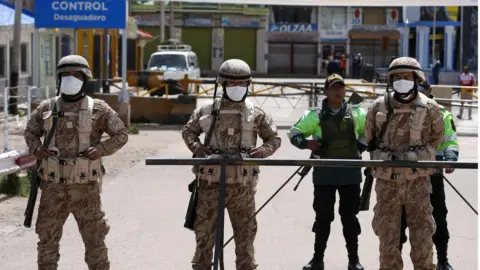Coronavirus: British nationals stranded abroad in 'dire' situation
British nationals unable to return home due to the coronavirus pandemic are in a "dire" situation, a former minister has warned.
Tory MP Caroline Nokes said many were stranded as countries closed their borders and airlines cancelled flights.
The government's call for people to return home as quickly as possible were like "empty words" to them, she added.
Foreign Secretary Dominic Raab said his staff were working with other nations and airlines to "overcome barriers".
Responding to an urgent question in Parliament, Mr Raab said the situation was being exacerbated by countries closing their borders "with no or little notice".
With the pandemic worsening across much of the world, the Foreign Office changed its travel advice on Sunday urging British nationals to return home as soon as possible.
Mr Raab said officials were working "night and day" with other governments and airlines to put urgent arrangements into place.
 Reuters
ReutersBut Ms Nokes, the MP for Romsey and Southampton North, said many of her constituents were not able to get through to embassy staff on the phone and had received standard e-mail messages telling them to contact their tour operator or insurer.
Many found themselves hundred of miles from airports, with hotel accommodation becoming increasingly scarce.

'Turned away'

BBC viewer Chas Parker said his 18-year old son Ben had been "turned away" by the British consulate in Phnom Penh, Cambodia because he didn't have an appointment.
He said Ben was given a card by security officers outside the building but when he e-mailed the consulate, he got a "bog standard" response.
Mr Parker said he feared for his son's safety amid an increasingly hostile atmosphere and rumours that he and other foreign nationals could be put into quarantine.
While he had since managed to book a seat for his son on a flight home via South Korea, Mr Parker said the whole process had been tough.

Commercial flights from many destinations were simply not available, she said, unless they were "priced at tens of thousands of pounds and routed via airports expected to close imminently".
"Hotels are closing, flights are cancelled, borders are closing and there are no routes home.
"He (Mr Raab) knows the situation is dire - but he knew that last week when he said in the House that we will look and liaise with the airline operators to make sure where there are gaps we can always provide as much support as possible."
"I ask him to explain how he is working with airlines with unused planes parked at airports around the globe to bring our people home... the vision of British citizens sleeping on the streets of Caracas is not a good one."

- A SIMPLE GUIDE: What are the symptoms?
- AVOIDING CONTACT: Should I self-isolate?
- STRESS: How to protect your mental health
- LOOK-UP TOOL: Check cases in your area
- MAPS AND CHARTS: Visual guide to the outbreak

Mr Raab said the rate of border closures and travel disruption was "unprecedented" in modern times and he had doubled the number of consular staff to deal with the "surge in demand".
Special flights
He said the UK was addressing specific problems facing British nationals in Peru, Singapore, Australia and New Zealand, working with their governments and airlines to keep routes going, and to re-open those that had closed.
Mr Raab told MPs that special flights will be laid on later this week to bring Britons back from Peru, while the UK had agreed with Singapore that it will act as a transit hub to help those trying to get back from Australia and New Zealand.
"Our overriding priority now is to assist the thousands of British travellers who need and want to return home," he told MPs.
"Where commercial options are not possible or limited by domestic restrictions we are in close contact with airlines and local authorities in those countries to overcome those barriers."
Repatriation efforts
More than 1,000 Britons have registered with the embassy in Peru, about 200 of whom will be on the first flight out of the country expected to leave on Wednesday.
Mr Raab also said he was concerned about the situation in the Indonesian island of Bali, currently home to about 6,000 British nationals.
But he pointed to successful repatriation efforts in other countries, including Morocco, where UK diplomats in recent days have facilitated 41 flights carrying more than 8,500 passengers before the country's borders were closed.
For those British nationals running out money, Mr Raab said that the Foreign Office, as a last resort, could provide emergency loans.
Several MPs raised concerns about the fate of cruise ships containing many British nationals.
The Coral Princess is struggling to get permission to dock at Rio de Janiero while the Costa Victoria is reportedly due to dock at Venice, close to the heart of the Italian epidemic.
